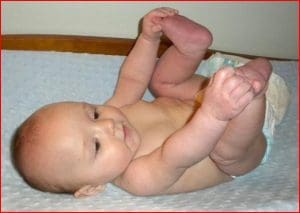A moment, take 1: I’m watching my four-month old grandson as he flails his hands about, trying so hard to get his fist into his mouth. He fails 100% of the time. He hits his cheek, his forehead, his ears.
A moment, take 2: I’m swimming laps in the pool, lost in thought about my day. I glance at the clock and realize I’ve lost track of time. I’ve just swum a half mile on autopilot.
A moment, take 3: My client shows up excited to tell me how well she did on her presentation to the executive board. Every day for the past month she has practiced a calm, grounded body so that she could deliver her message from a place of confidence instead a place of panic.
A moment, take 4: One month later, my grandson reaches out with purpose, grasps a plastic ring and, with intense concentration, moves it purposefully and directly toward his mouth. He succeeds every time.
Your Body, Brain, and Heart Are the Same System
My colleague who studies Neurobiology says, “Nothing changes unless the brain changes.” A colleague who uses martial arts in his leadership work says, “Every habit starts and ends in the body.” Hmm.
Who is more correct? I believe they both hold the truth. You cannot change your behavior JUST by thinking about it; you must actually DO something with your body, creating muscle memory. AND since you are essentially one big nervous system, everything you do engages your brain and creates new neural connections.
This is why physical practices and movement are equally important for those seeking to change a habit, become better leaders, or live a happier life. Whatever you seek to change, you must think it AND do it, many times.
After counting my grandson’s fidgeting one day, I calculated that he did that “hand-to-mouth” move over 1,000 times before he could hit the target. He’ll repeat the same relentless practice for rolling over, standing up, and speaking.
My ability to swim on autopilot happened the same way. Having swum competitively for eight years, plus some practice for another 30, I estimate I’ve done 500,000+ flip turns in my life – my body can execute a clean flip off the wall without my even having to think it.
This is the essence: You become what you repeatedly do. The corollaries: You ARE what you’ve repeatedly done in the past; and, You can BECOME what you repeatedly do from today forward. Muscle memory, emotional memory, brain chemistry – all part of the same system.
Seven Places to Start a New Habit
Here are some simple emotional practices that can help recalibrate your base mood. Approach these with an intention to engage your physical senses which will influence your emotional state and rewire your brain.
- Smile more often
(it improves “muscle memory” on your face and invokes positive feelings) - Keep a Joy List or write down daily blessings
(the physical writing engages your body as it tones your “awareness muscle”) - Take two deep breaths and relax your shoulders, ten times a day
(trains your body to find a calm place under pressure) - List what’s RIGHT in a situation before listing the problems
(balances your attention and your perspective) - Count to ten before reacting to any situation
(trains your emotions to wait – until your brain catches up) - Hold your arms at your sides – uncrossed — in all conversations
(helps your body experience the feeling of openness/acceptance to other ideas and people and improves your listening skills) - Hang out with people who already live in the place you want to live
(As mammals, we learn our emotional cues from others. If you want to be more positive, hang out with optimists. If you want to eat better, hang out with the health buffs)
Consider a physical or emotional aspect of yourself that you want to recalibrate. What is a practice that you might use to help you get used to a new way of being? Start with just one tiny thing – one food, one habit, one choice, one relationship, even just one word you use. Shift it, then practice it regularly from this day forward. Just one…

